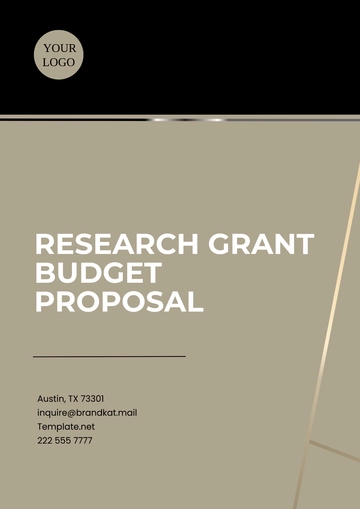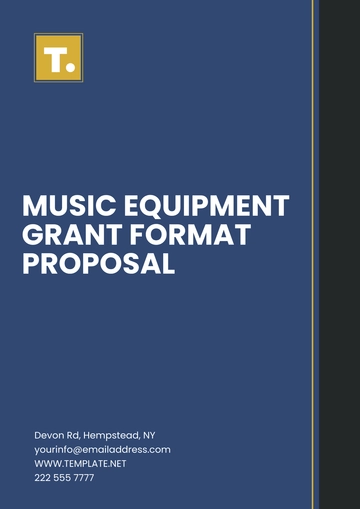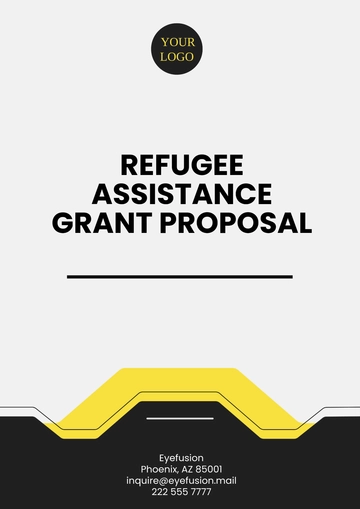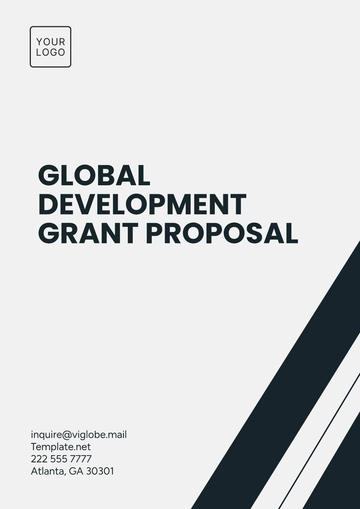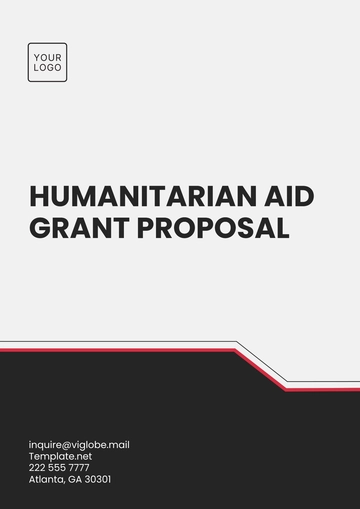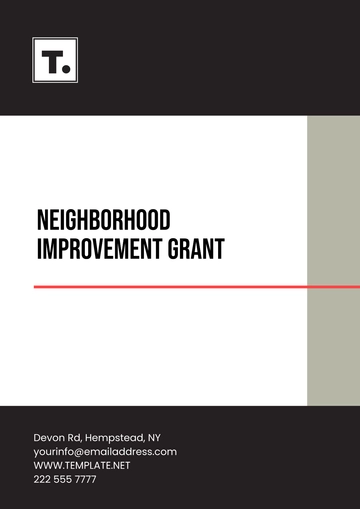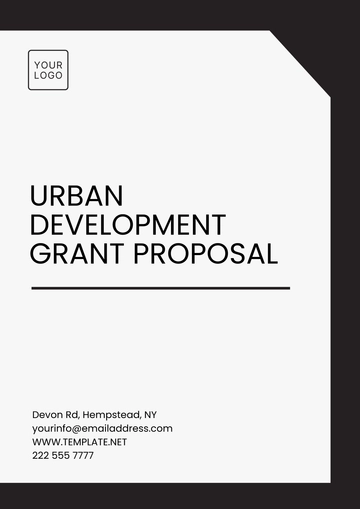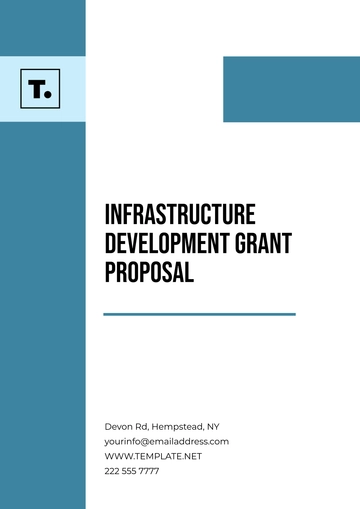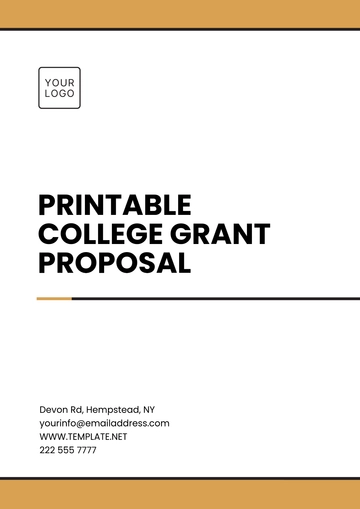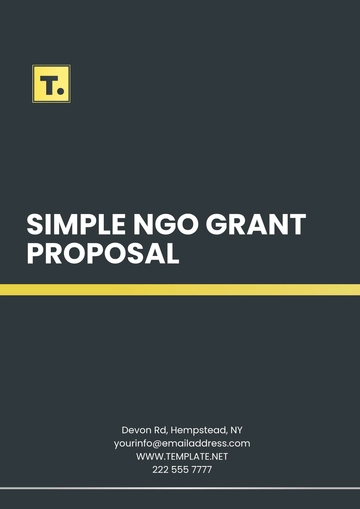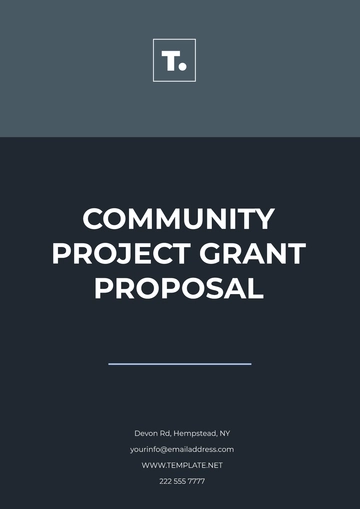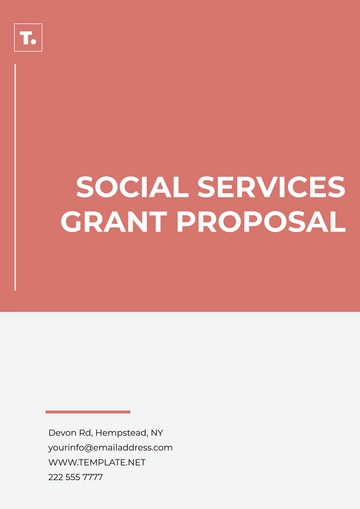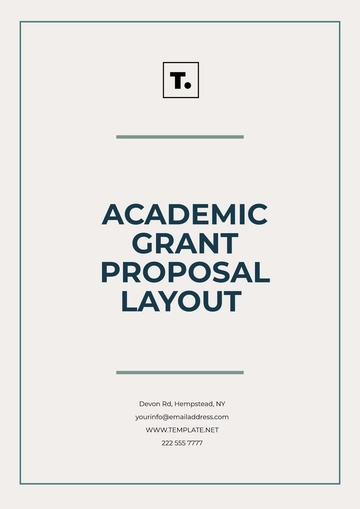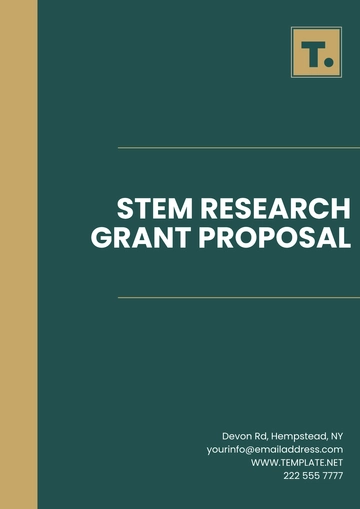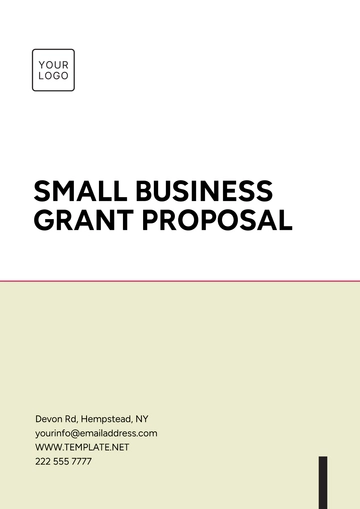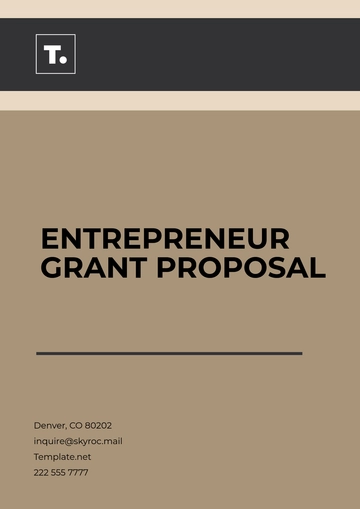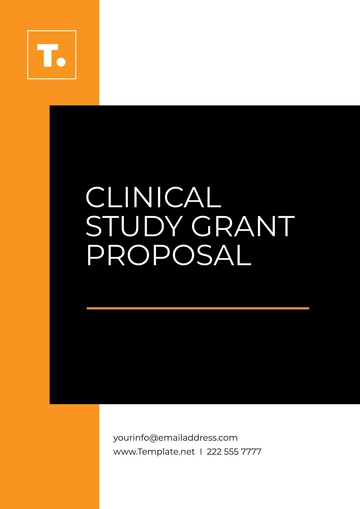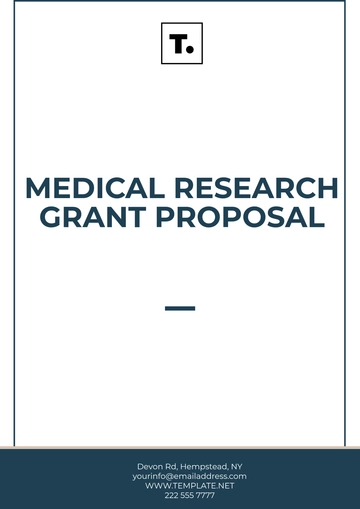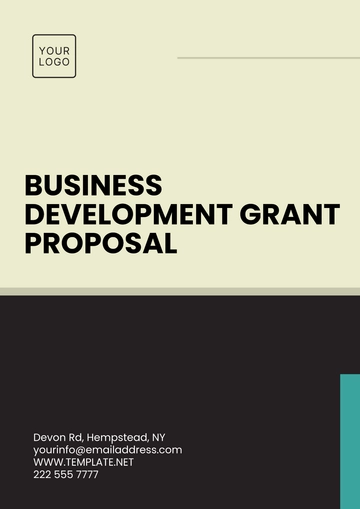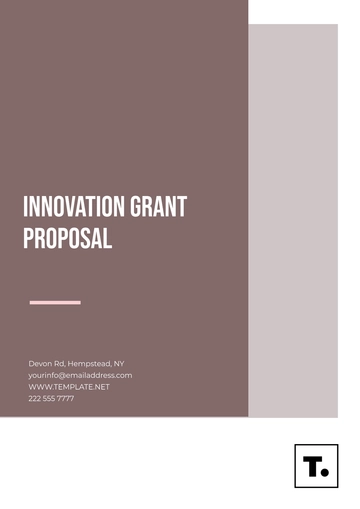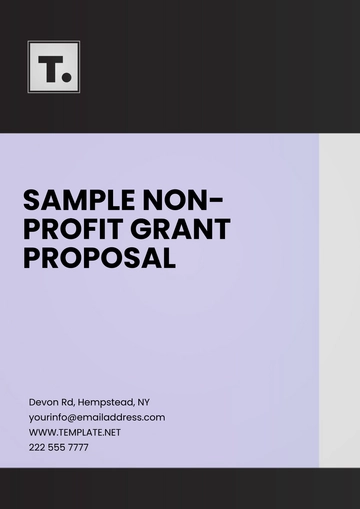Free Marketing Guide to Grants and Funding
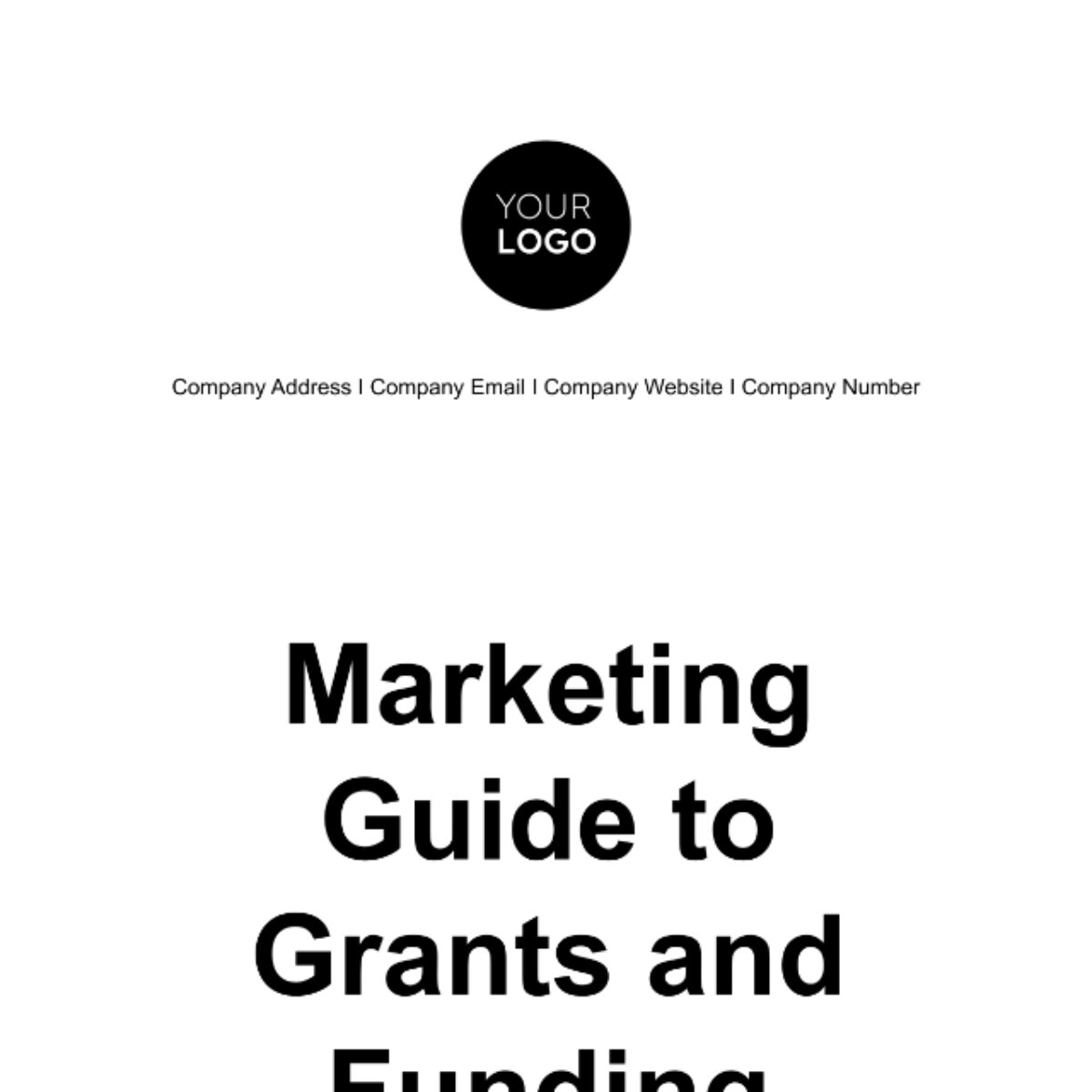
1. Executive Summary
Welcome to the "Marketing Guide to Grants and Funding." In the dynamic landscape of marketing, securing financial resources is often the key to unlocking innovation and growth. This comprehensive guide serves as your roadmap to understanding the significance of grants and funding in the realm of marketing. By leveraging external financial support, businesses can supercharge their marketing initiatives, reaching new heights of success. In the pages that follow, we will explore the various types of grants and funding sources, provide insights into identifying opportunities, guide you through the application process, and show you how to effectively manage and maximize the impact of grant funds on your marketing efforts. Whether you are a startup seeking to launch a groundbreaking marketing campaign or an established enterprise looking to expand your reach, this guide is your trusted companion in navigating the complex world of grants and funding in marketing. Get ready to embark on a journey toward marketing excellence, powered by financial support and strategic insights, all in the context of the year [Year].
2. Introduction to Grants and Funding
In the ever-evolving landscape of marketing, where innovation and adaptability are paramount, securing financial resources through grants and funding has emerged as a crucial catalyst for success. This section serves as your gateway to understanding the pivotal role that grants and funding play in the world of marketing, particularly in the context of [Year].
Importance of Grants and Funding in Marketing: Marketing is the lifeblood of any business, and its effectiveness often hinges on the availability of resources. Grants and funding sources inject a vital dose of financial support, enabling businesses to conceive and execute ambitious marketing initiatives that might otherwise remain beyond reach. In a world where competition is fierce and consumer expectations are ever-evolving, the capacity to innovate and invest in cutting-edge marketing strategies can mean the difference between thriving and merely surviving.
Supporting Marketing Initiatives: Grants and funding extend a helping hand to businesses seeking to enhance their marketing efforts. Whether it's launching a groundbreaking advertising campaign, conducting in-depth market research, or adopting advanced digital marketing technologies, these financial resources provide the means to turn visionary marketing ideas into tangible reality. Moreover, grants and funding can facilitate the development of sustainable, long-term marketing strategies that not only capture immediate attention but also nurture enduring customer relationships.
As we delve deeper into this guide, we will uncover the myriad ways in which grants and funding can empower businesses to excel in marketing. From identifying opportunities to mastering the application process and optimizing fund utilization, you will embark on a journey of discovery that harnesses the power of financial support to fuel your marketing ambitions in the dynamic landscape of [Year].
3. Types of Grants and Funding
In the multifaceted world of grants and funding, various sources offer a diverse array of financial opportunities for businesses aiming to bolster their marketing endeavors in [Year]. Understanding these different types is pivotal for navigating the landscape effectively.
Type of Funding | Overview | Examples |
Government Grants | Government agencies at local, regional, and national levels often allocate funds to support businesses and initiatives that align with specific economic and societal objectives. These grants can be invaluable for businesses looking to implement marketing strategies with broader public benefit. | Economic development grants, research and development grants, environmental grants, and innovation grants. |
Private Grants | Private organizations, foundations, and philanthropic entities contribute significantly to the grant landscape. These grants are typically funded by private corporations, individuals, or nonprofit foundations, and they may have specific areas of focus, such as education, healthcare, or environmental sustainability. | Corporate social responsibility grants, educational grants, and industry-specific grants. |
Crowdfunding | Crowdfunding has emerged as a dynamic alternative for raising funds, particularly for marketing campaigns and creative projects. It involves soliciting contributions from a large number of people, often through online platforms. It allows businesses to engage directly with their audience, fostering a sense of community support. | Crowdfunding platforms like Kickstarter, Indiegogo, and GoFundMe. |
Venture Capital and Angel Investors | While not traditional grants, venture capital and angel investors provide funding in exchange for equity or ownership in the business. This form of funding is particularly relevant for startups and innovative marketing ventures seeking significant financial support. | Venture capital firms and individual angel investors. |
Corporate Sponsorships | Businesses seeking to forge strategic partnerships with larger corporations may explore corporate sponsorship opportunities. These arrangements often involve financial support in exchange for promotional considerations, making it a valuable avenue for marketing initiatives. | Sponsorship agreements with companies in related industries. |
Nonprofit and Industry Associations | Nonprofit organizations and industry associations frequently offer grants and funding to support projects that align with their mission or industry goals. These sources can be especially relevant for businesses operating within specific sectors. | Grants from trade associations, industry-specific nonprofits, and chambers of commerce. |
The table provides a concise overview of the different types of funding sources, their respective overviews, and examples of each.
4. Identifying Grant Opportunities
In the pursuit of grants and funding for your marketing endeavors, the first and foremost step is to identify the right opportunities. This involves a strategic approach to ensure that the grants you target align with your business's goals and initiatives. Here are some strategies and tips to guide you:
Define Your Objectives: Before embarking on your search for grant opportunities, it's crucial to have a clear understanding of your marketing objectives. Knowing what you aim to achieve will help you narrow down potential grants that align with your goals.
Research Grant Databases: Numerous online databases and directories compile information on available grants. Websites like Grants.gov (for U.S. federal grants) and GrantWatch offer comprehensive listings. These platforms allow you to filter grants by category, industry, and eligibility criteria.
Tap into Local Resources: Depending on your location, there may be regional or local grant opportunities available. Explore government websites, regional business associations, and chambers of commerce for information on grants specific to your area.
Industry Associations: Industry-specific associations often provide grants and funding opportunities for businesses operating within their sector. Joining these associations and staying informed about their programs can open doors to relevant funding options.
Network with Peers: Attend industry conferences, workshops, and networking events to connect with peers and professionals. They may have valuable insights and recommendations for grant opportunities they've pursued in the past.
Leverage Online Communities: Online forums, social media groups, and community platforms can be excellent sources of information. Engage in discussions and seek recommendations from individuals who have experience with grants in your industry.
Consult Grant Professionals: If your budget allows, consider consulting with grant professionals or agencies specializing in grant research. They can provide tailored advice and help you identify opportunities aligned with your business objectives.
Stay Informed: Grants and funding opportunities are dynamic and can change frequently. Set up alerts or subscribe to newsletters related to grants in your field to stay informed about new opportunities as they arise.
By strategically identifying grant opportunities using these methods and staying focused on your marketing objectives, you can increase your chances of securing the financial support needed to propel your marketing initiatives in [Year].
5. Grant Application Process
Navigating the grant application process is a pivotal step in securing funding for your marketing initiatives. Here's a concise step-by-step guide to help you through this crucial phase:
Identify Eligibility: Before diving into the application process, carefully review the eligibility criteria outlined in the grant opportunity. Ensure that your business and project align with the grant's requirements. If you're unsure, reach out to the grant provider for clarification.
Prepare a Grant Proposal: Most grants require a detailed proposal outlining your project's goals, methodology, budget, and expected outcomes. Craft a compelling proposal that clearly articulates how the grant will support your marketing objectives and benefit the broader community or industry.
Gather Required Documentation: Grant applications typically necessitate various supporting documents, such as financial statements, business plans, and letters of support. Ensure you have all the necessary paperwork in order before starting the application.
Complete the Application Form: Grant providers often offer online application forms that must be filled out. Follow the instructions meticulously, providing accurate and concise responses to all required fields.
Budget and Financial Information: Include a detailed budget that outlines how the grant funds will be utilized. Transparency and accuracy are crucial in this section. Be prepared to explain and justify each expense.
Timeline: Outline a realistic timeline for your project's implementation, including milestones and deadlines. Grant providers want to know that your project is well-planned and feasible within the allocated time frame.
Review and Proofread: Before hitting the submit button, thoroughly review your application for errors, inconsistencies, or missing information. A well-polished application demonstrates your commitment and professionalism.
Letters of Support: If the grant application requires letters of support or recommendation, reach out to your professional network, collaborators, or stakeholders who can vouch for the significance of your project.
Submission: Submit your application by the deadline specified in the grant opportunity. Keep a record of your submission confirmation, and be prepared for follow-up questions or requests for additional information.
Follow-Up: After submission, be proactive in following up with the grant provider. Confirm receipt of your application and inquire about the timeline for the selection process. This demonstrates your continued interest and engagement.
Navigating the grant application process requires attention to detail and a clear articulation of how your marketing initiatives align with the grant's objectives. By following these steps, you'll be well-prepared to submit a compelling application that increases your chances of securing the funding you need for your marketing endeavors in [Year].
6. Budgeting for Marketing Initiatives
Effective budgeting is a fundamental aspect of ensuring that your marketing initiatives achieve their objectives while making the most of the grant funds secured. Here's a concise overview of key considerations:
Grant Funds Integration: Start by clearly defining how the grant funds will be integrated into your marketing budget. Ensure that they align with your project's goals and are allocated to areas that directly support those objectives.
Comprehensive Budget: Create a comprehensive marketing budget that encompasses all aspects of your initiatives. This should include expenses for advertising, content creation, digital marketing tools, personnel, and any other relevant costs.
Prioritization: Prioritize marketing strategies and campaigns based on their alignment with your project's objectives and expected return on investment (ROI). Allocate a larger portion of your budget to strategies that are likely to yield the most significant results.
Flexibility: Maintain flexibility in your budget to accommodate unexpected expenses or changes in strategy. Grants often have specific guidelines on fund utilization, so ensure compliance while retaining the ability to adapt when necessary.
Monitoring and Reporting: Implement a system for monitoring and reporting on budget expenditures. This helps ensure that grant funds are used as intended and allows for adjustments if certain strategies are underperforming.
Contingency Planning: Include a contingency fund in your budget to address unforeseen challenges or opportunities. Having reserves in place can help you seize unexpected marketing prospects without compromising your overall budget.
Grant Reporting: Be prepared to fulfill any reporting requirements associated with the grant. Grant providers often request progress reports or financial statements to verify that funds are being used appropriately.
Periodic Review: Regularly review your budget to assess its effectiveness in achieving your marketing goals. Adjust allocations based on performance metrics and evolving project needs.
By carefully budgeting for your marketing initiatives and integrating grant funds strategically, you can maximize the impact of your efforts while ensuring compliance with grant guidelines. This approach enhances the likelihood of achieving your marketing objectives in the dynamic landscape of [Year].
7. Managing Grant Funds
Effective management of grant funds is crucial to ensure that they are utilized optimally and in compliance with grant requirements. Here are some key tips for successful fund management:
Dedicated Tracking: Create a dedicated system for tracking grant expenses separately from other finances. This ensures transparency and simplifies reporting.
Expense Documentation: Keep thorough records of all expenses related to the grant, including receipts, invoices, and payment records. Proper documentation is essential for compliance.
Grant Guidelines: Familiarize yourself with the specific guidelines and requirements outlined by the grant provider. Ensure that all expenses align with these guidelines.
Budget Adherence: Stick to your approved budget and avoid diverting grant funds to unrelated expenses. Grant providers typically require strict adherence to budget allocations.
Reporting Obligations: Be aware of any reporting obligations associated with the grant. Prepare and submit reports in a timely manner, including financial statements and progress updates.
Regular Reconciliation: Periodically reconcile your grant expenses with your budget to ensure that you are on track and not overspending in any category.
Seek Guidance: If you have questions or uncertainties regarding fund management or compliance, don't hesitate to reach out to the grant provider for clarification or guidance.
Professional Support: Consider seeking professional financial or accounting support to ensure that your grant funds are managed effectively and in compliance with regulations.
By following these tips and maintaining a meticulous approach to grant fund management, you can make the most of the funds available and maintain a strong partnership with grant providers for your marketing initiatives in [Year].
8. Compliance and Reporting
Staying compliant with grant requirements is essential to maintain a positive relationship with grant providers and ensure the continued flow of funds for your marketing initiatives. Here's a brief overview of key considerations:
Familiarize Yourself: Thoroughly read and understand the grant agreement and associated guidelines. Ensure that you are aware of all compliance requirements, reporting deadlines, and expectations set forth by the grant provider.
Budget Adherence: Stick to your approved budget allocations. Avoid diverting grant funds to unrelated expenses, as this can result in non-compliance and may jeopardize future funding opportunities.
Expense Documentation: Maintain meticulous records of all grant-related expenses. Keep receipts, invoices, and payment records organized and readily accessible. Proper documentation is crucial for demonstrating compliance.
Reporting Obligations: Be aware of reporting obligations specified in the grant agreement. This may include financial reports, progress reports, or other documentation required by the grant provider.
Timely Submissions: Ensure that all required reports and documentation are submitted on time and in the format specified by the grant provider. Late or incomplete submissions can lead to compliance issues.
Communication: Maintain open communication with the grant provider. If you encounter challenges or foresee deviations from the grant plan, proactively discuss these matters with the provider and seek guidance.
Professional Assistance: Consider engaging financial or legal professionals with expertise in grant compliance and reporting. They can help navigate complex compliance requirements and ensure accurate and timely submissions.
By prioritizing compliance and adhering to reporting obligations, you not only fulfill your responsibilities to the grant provider but also build trust and credibility within the grant community. This can lead to continued support for your marketing initiatives in [Year] and beyond.
9. Additional Resources
Resource Name | Description | Website Link |
Grants.gov | A comprehensive database of U.S. federal grants. | Grants.gov |
Foundation Center | Offers valuable resources on grants and philanthropy. | Foundation Center |
GrantWatch | Provides listings of grants, funding opportunities, and news. | GrantWatch |
National Endowment for the Arts | Grants for arts and cultural projects. | NEA Grants |
Kickstarter | A popular crowdfunding platform for creative projects. | Kickstarter |
Indiegogo | Another prominent crowdfunding platform for various projects. | Indiegogo |
U.S. Small Business Administration (SBA) | Resources for small businesses, including grant information. | SBA Grants |
Council on Foundations | A nonprofit organization supporting philanthropic efforts. | Council on Foundations |
These resources can serve as valuable tools for businesses seeking grants and funding to support their marketing initiatives in [Year].
10. Glossary
Term | Definition |
Grant | A financial award provided by an organization or government agency to support a specific project or initiative, often without the requirement of repayment. |
Funding | Financial support provided to fund various projects, activities, or business operations. Funding can come from grants, investors, or other sources. |
Grant Proposal | A formal document submitted to a grant provider that outlines the details of a project or initiative, including its objectives, budget, and expected outcomes. |
Budget Allocation | The process of distributing funds from a budget to specific categories or expenses, often in line with project objectives. |
Compliance | The adherence to rules, regulations, and guidelines set by grant providers to ensure that funds are used as intended. |
Reporting Obligations | Requirements for grant recipients to submit periodic reports detailing the progress and financial status of a project. |
Crowdfunding | A method of raising funds for a project or venture by soliciting contributions from a large number of individuals, typically through online platforms. |
Venture Capital | Investment provided to startups or businesses by venture capital firms in exchange for equity or ownership stakes. |
Corporate Sponsorship | A financial arrangement in which a business provides funding to support a specific event, project, or initiative in exchange for promotional considerations. |
Nonprofit Organization | An organization that operates for a charitable, educational, or community-based purpose and is often eligible for grants and donations. |
This glossary can be a helpful reference for individuals and businesses navigating the world of grants and funding for marketing initiatives in [Year].
11. Appendices
Grant proposals, budget templates, and other relevant documents are included as attachments.
- 100% Customizable, free editor
- Access 1 Million+ Templates, photo’s & graphics
- Download or share as a template
- Click and replace photos, graphics, text, backgrounds
- Resize, crop, AI write & more
- Access advanced editor
Unlock funding opportunities with the Marketing Guide to Grants and Funding Template, available exclusively on Template.net. This editable and customizable guide provides comprehensive insights. Tailor strategies effortlessly with our Ai Editor Tool, ensuring alignment with your funding goals. Elevate your funding endeavors with clarity and precision, securing resources for success.
